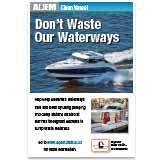Rinse Boat After Use

Rinse your boat with fresh water after each use to help reduce the need for cleansers and heavy-duty products.

The discharge of raw and inadequately treated sewage from boats can negatively impact human health and the environment. As such, it is especially important to limit or prevent sewage discharges in popular fishing and swimming areas or sensitive wildlife areas.
Sewage discharges can introduce disease-causing bacteria and viruses into a waterbody, creating human health concerns. When people are exposed to these bacteria and viruses, they can become sick with the stomach flu or other more serious illnesses. Exposure generally results from accidental consumption of contaminated water while swimming. However, people can also become sick from eating clams, mussels, and oysters harvested from contaminated shellfish beds. (EPA, 2021)
Oyster Reef (Photo by EPA)
Sewage impairs water quality by increasing nutrient levels, altering pH, and decreasing both water clarity and oxygen availability. This reduced water quality can affect the behavior, reproduction, health, and survival of many aquatic organisms, including fish, shellfish, coral, mangroves, and Insects.
All vessels with installed toilets must be equipped with a U.S. Coast Guard-certified marine sanitation device (MSD), which either treats sewage before discharging or stores sewage in a holding tank. Federal law prohibits the discharge of untreated sewage from such vessels into U.S. waters, extending to three miles from shore. The discharge by such vessels of any treated or untreated sewage is prohibited in rivers and lakes.
Fishing Boat (Photo by EPA)

A guide was developed to make it easy for recreational boaters to understand what federal law says about handling the sewage generated onboard vessels. Boaters will learn about marine sanitation devices, no-discharge zones, and how to use pumpout facilities.

An ADEM produced brochure encouraging boaters to use pump stations to reduce sewage dumping in Alabama waters.

Poster developed by ADEM to bring awareness to the importance of keeping boats clean.

Rinse your boat with fresh water after each use to help reduce the need for cleansers and heavy-duty products.

Getting out on the water is not only fun and great exercise, the more you use the water, the more likely it is you'll think about protecting it. So go ahead, go for a swim, get your fishing pole, take a boat for a ride, or attend a water festival near you.

When water rushes off hardened surfaces, erosion of sediments degrade water conditions and smother and disrupt seagrass growth and the habitat for benthic organisms they provide.

Compounds like oil, grease, and heavy metals take a long time to break down and threaten the health of both aquatic and human life.

Litter is not only unsightly, but it also causes a variety of problems to the ecosystem as it enters our waters where it is often is mistaken for food by fish and invertebrates.

Too much fertilizer, pet waste, and other nutrients in our water often lead to serious problems like lowering dissolved oxygen levels, preventing seagrass growth, and killing fish.

Disease-causing microorganisms, including bacteria, viruses, and other single-celled organisms, are referred to as pathogens, some, like Salmonella, cause human health problems.

While pesticides are designed to be toxic to certain organisms, they can often be harmful and kill other species in the marine system that are important for the entire ecosystem.